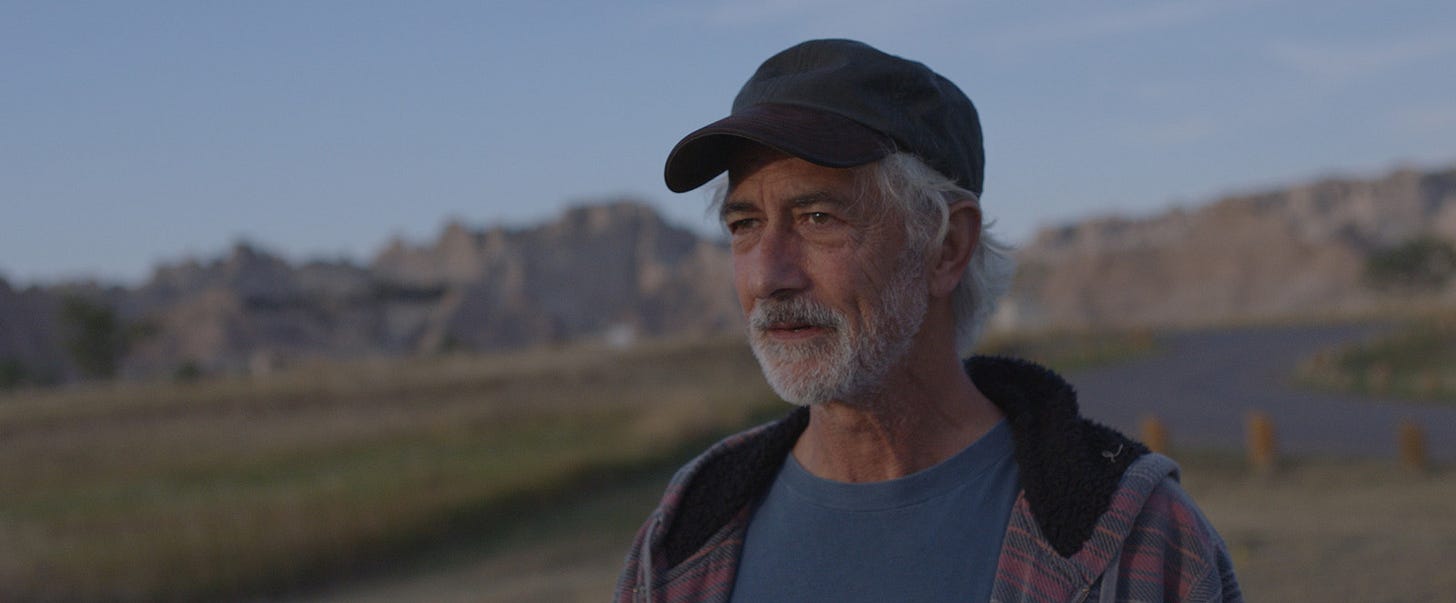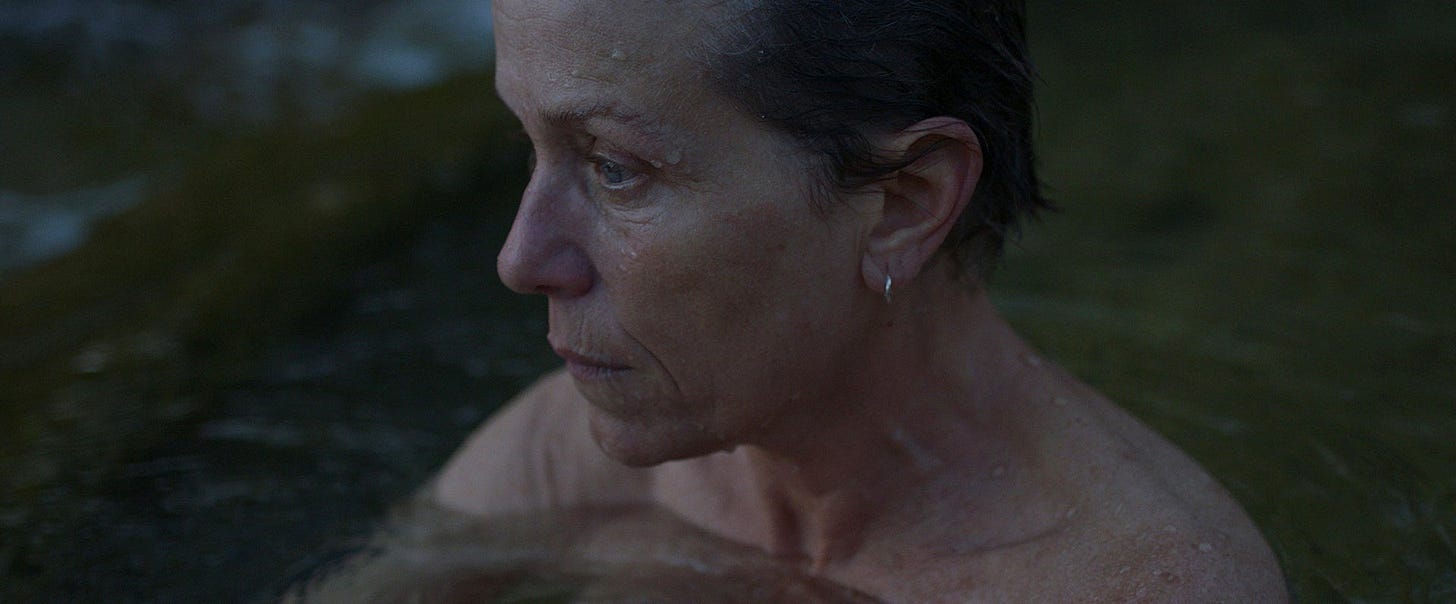I am now going to engage with this movie in probably the worst way possible.
“Nomadland” is the second Chloe Zhao movie I have ever seen. While I was in prison, I saw my first one, and it was “Eternals”. This is… unfortunate. I’ve always enjoyed the thrill of marching forward in chronological order through a director’s filmography, seeing where they began to evolve, recognizing where they lost interest in some ideas and motifs. Rise and fall, three-act structure. You’re not going to learn a great deal about Brian De Palma if you see “Hi Mom”, followed by “Scarface”, followed by “Redacted”. But you will see certain ideas recur, certain agenda accepted and rejected over time. And, most importantly, seeing all three will make the viewing pleasure of all three so much more gratifying in retrospect.
Unfortunately, it looks like I’m going to be woefully out of order for Ms. Zhao. As a consolation, when I was down I followed the “narrative” of Zhao, which was considerably more conventional, depressingly so. That being, of course, the critics’ darling, turned Oscar winner, turned gleefully amoral sellout. Well, that was the narrative, maybe not the truth. “Eternals” was one of many movies postponed throughout the pandemic, and I read dozens of profiles of Zhao talking about “Eternals”, seemingly saying, “I love Marvel! I’ve seen like ten of these!” Such articles kicked up hope for “Eternals”, but also overshadowed “Nomadland”, which ended up winning Best Picture at the Oscars.
“Nomadland” seemed like an extension of the type of movie Zhao had apparently been nailing by then – austere, quiet, minimally-budgeted films about serious people living on margins of society. “Nomadland” feels like a supersized exploitation of that, complete with a major Oscar winner in Frances McDormand. McDormand plays Fern, a crusty loner traveling the countryside, living out of her van and simply getting by. She’s opted out of society, subsisting on minimal meals, living out of her vehicle, stopping and starting as she pleases. At the start of the movie, she’s moving in and out of places where she is recognized. She’s been doing this for a long time, earning the grudging poker-faced respect of others. In one early sequence, she’s cautiously approached by a young girl, and it seems clear this kid has spent several years of her childhood wondering where good ol’ Fern was going.
I’ve read a lot of surface-level critiques of the presence of Amazon within this movie (which, for the record, was made with Disney dollars – even Fern cannot escape our scumbag capitalist overlords). When Fern senses some lightness in the coffers, she returns to the blandly-sterile nightmare of Amazon, where she packages and ships cardboard boxes filled with plastic crap. Visually, this movie captures more of a deep focus, on the horizon, what lies beyond. But the shot composition is tight, keeping the actual open-air space of the characters limited, muted. Not so in the Amazon warehouses, which perversely look more expansive than the outside world with their high ceilings that seem to reach to Heaven. Fern, again, has a reputation, a woman who passes in and out of town to work a few hours, earn a corporate paycheck and keep living off the land. There doesn’t seem to be anything political about Fern’s attitude, she doesn’t fret about taking Amazon’s money. It’s cash to help her survive, and who is she to second-guess the source?
“Nomadland”, which depicts a small community of Ferns who live happily surviving on the spoils of the land, doesn’t let Fern be unencumbered by criticism. When she encounters family members, they chastise her for a selfish life living off the grid, believing they are owed affection and support she has never once promised them. The excellent David Strathairn shows up as Dave, a fellow survivor, just seeking companionship, and hoping to help. Fern likes him, but rudely shoves away his thoughtfulness and attention. These participants in Fern’s life are turned off by Fern, but while this is a stubborn woman, you can tell that she takes their critiques and angry barbs to heart. Maybe she is doing this all wrong. Maybe it’s too late for an old lady to change.
McDormand won her third acting Oscar for this movie, earning Best Actress just as she did for the brilliant “Fargo” and the other movie, “Three Billboards Outside Ebbing, Missouri”. This is GOAT territory: McDormand is only one of seven humans to win at least three acting Oscars. A quick look at this – as I’ve mentioned before, I love my Oscar Metrics:
Firstly, I’m gonna disqualify Walter Brennan from the GOAT conversation, who won three Best Supporting Actor Oscars. You can win one of those with only one convincing dimension to your work, because there’s less dramatic weight placed upon your characterization.
Secondly, for that matter, there’s three-timers Meryl Streep, Jack Nicholson and Ingrid Bergman. The latter two won Best Supporting trophies for “Terms Of Endearment” and “Murder On The Orient Express”, and I don’t think either of those performances rank among the top five for either of these actors. Streep, who has been nominated approximately four hundred times (citation needed), deserved the recognition she received for her Best Supporting turn in “Kramer Vs. Kramer” (she played Kramer, fyi). But one of her lead actress statuettes was for “The Iron Lady”, a garbage movie about a garbage person, so she’s excused from this conversation.
That leaves McDormand, Daniel Day-Lewis and Katherine Hepburn. DDL is a ratio king, earning three Best Actor statues for incredible leading man work with such a small resume (and category fraud means he was cheated out of a deserved Best Supporting Actor for “Gangs Of New York”). Hepburn is the only person to have FOUR acting Oscars. I mostly can’t slander her excellent work, though I never saw her in 1933’s “Morning Glory”, her first Oscar.
How does McDormand stack up against those two? Obviously she’s great in “Fargo” and “Three Billboards. But also, she’s almost entirely responsible for her work in “Nomadland”, since she served as a producer. Since “Nomadland” won Best Picture, that was a non-acting Academy Award for her as well as a producer. There is only one person in history who has an Oscar for producing and acting in the same movie, and her name is Frances McDormand. Is she the GOAT? That’s for a number of GOAT Professors in the distant future to determine. But she definitely belongs in the conversation.
I look forward to further exploring Zhao’s filmography. “Nomadland” has an elegiac vibe that goes unmentioned, as if it seems that this is the end of the road for Fern, and she’ll be the last to recognize. Maybe this lifestyle hasn’t worked out for her. Zhao captures several other nomads, some of them real, and sees their powerful interpersonal bonds either with each other or with strangers. Fern, meanwhile, stews on her own. Maybe she’s a maverick, and it’s lonely for someone like that. Or maybe she’s a stubborn old coot who is determined to let no one dictate her life. There’s a moral complexity to this depiction, suggesting there’s no right or wrong way to be Fern. Race the sun to the horizon. Get to bed, and do it again tomorrow. The world will always be there, waiting.
That sort of lack of immediacy, probably a strength in Zhao’s work, means she was likely the wrong choice for “Eternals”. Many of the Institution Movies we watched in prison played on a loop for a long period of time, so I saw it a lot. What I witnessed was a director with an eye for certain tableau, forced to accommodate phony glittery computer effects, an interesting cast somehow with no chemistry, and writing that was sub-soap-level, loaded with desperately unfunny quips to suggest the funnier Marvel screenwriters never made it back from the “blip”. It breaks my heart: in retrospect, this is a union of two great visual artists, that being Jack Kirby and the director of “Nomadland”. So why is it, visually, so sludgy and depressing? Credit to Sian Heder, who directed the following year’s Best Picture winner, “CODA”. She capitalized partly with a cameo as herself on HBO’s “Barry” as someone who pivoted from Oscar glory to directing a dopey superhero epic called “Mega Girls”. Oscar-winner on Oscar-winner crime!
In prison, there are different forms of the same concept, the hygiene bag. You are usually granted a bag of hygiene when you arrive. The contents may differ, but largely we’re talking a toothbrush, toothpaste, some toilet paper and bottles of shampoo/soap (two-in-one), with two disposable one-time-use razors which often had to be turned in so that you can get another one – the institution was aware that there could be plenty of blades circulating in the prison, which is also why most places I had been to limited you to only a three-inch toothbrush. There was a tiny comb in there too.
Generally, you could refuel at commissary and get upgraded versions of stuff, including bars of soap and shampoo (the two-in-one, by the way, can be seen in the Stallone/Schwarzenegger prison movie “Escape Plan” – they did their research). If no one was putting money on your books, you have to keep going to your unit team to ask for more hygiene. And they, in turn, would have to determine if you were truly “indigent” before giving you more, shaming you further while making you beg for soap. Prison thrived on making you undignified, and if you had few family ties making sure your commissary account was full, you’d earn laughter and gossip from c.o.’s who knew you were alone in the worst place in the world.











I loved Nomadland! I was annoyed when a friend of mine tried to use Zhao's wealthy, connected background against the film itself. It's one thing to not separate the art from the artist when the artist does direct harm to people, but there are lots of rich artists who make crappy films. I don't see a problem with a rich woman making a film about nomads if she does it as well as this one.
The terrible word of mouth for Eternals actually led me to avoiding Nomadland too, thanks for making me rethink a dumb decision.
How did haircuts work in prison?